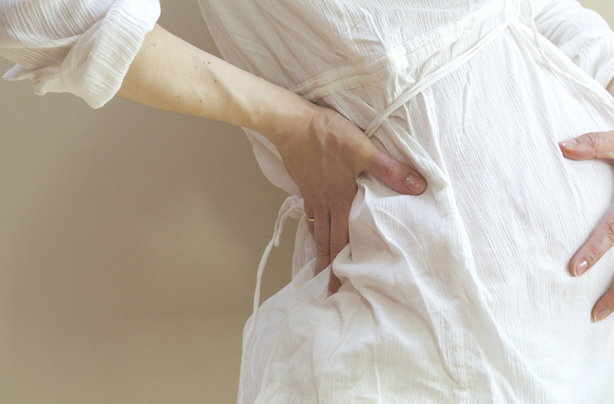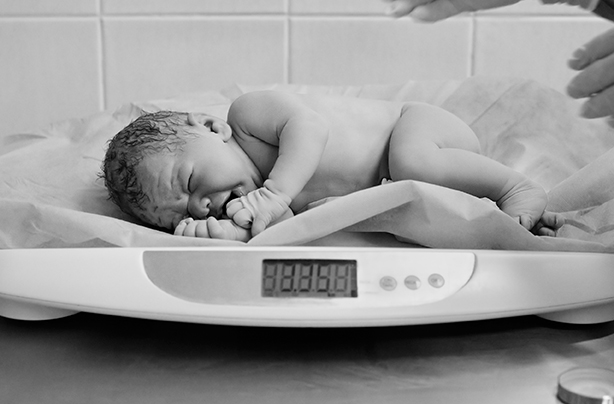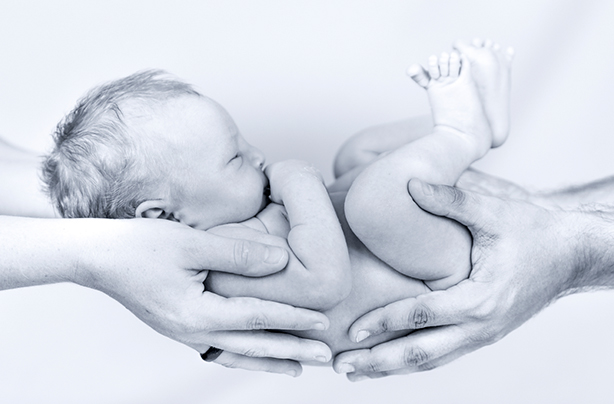Signs of premature labour: Do you know how to spot the signs of early labour?
Around 7% of babies in the UK are born prematurely each year.

Every pregnant woman worries about the health of their baby, and wants their labour and birth to go smoothly.
Some women may experience early signs of labour when it's time for their baby to arrive, but what if your labour itself comes early? If your baby has other ideas and wants to be born early, it's important to know how to spot the signs of early labour.
Here's how to reduce the risk of premature labour and what it means if it happens to you.
What is early labour?
Premature labour, or early labour, is when you go into labour before you are 37 weeks pregnant. About 7% of babies are born prematurely in the UK annually, according to baby charity Tommy's - that's about 45,000 a year.
Could early labour happen to me?
Premature labour can happen to any pregnant woman for various reasons, but there are those who are more at risk than others. If you smoke, are underweight, or a young mother, you may have a higher likelihood of experiencing a premature labour.
What are the causes of early labour?
Pre-eclampsia Pre-eclampsia is a condition that causes high blood pressure, swelling of the extremeties, visual problems and headaches, and usually affects women during the second half of their pregnancy. The exact cause isn't known, but according the NHS, the only way to cure pre-eclampsia is to deliver the baby, so you'll usually be monitored regularly until it's possible for your baby to be delivered. This will normally be at around 37-38 weeks of pregnancy, but it may be earlier in more severe cases.
Foetal abnormalities Between 2% and 3% of pregnancies are complicated by foetal anomalies. These may be picked up and discussed during early trimesters, or discovered later during your pregnancy - either way, babies with foetal abnormalities who are carried to term are more likely to arrive early.
Parenting advice, hot topics, best buys and family finance tips delivered straight to your inbox.
Cervical incompetence Cervical incompetence, also known as cervical inefficiency, essentially means a weak cervix. It can either occur naturally, or have been caused by previous pregnancies and your risk is higher if you've had previous premature births. If you have cervical incompetence, you may be offered a cervical stitch, which is removed around 37 weeks so you can give birth, but women with the condition have an increased risk of premature labour.
Multiple pregnancy Carrying more than one baby generally makes you more likely to deliver early. The average gestation period is 37 weeks for twins, 34 weeks for triplets, and 32 weeks for quadruplets, and most multiple pregnancies will be induced at 38 weeks if birth does not occur naturally due to increased health risks after that point. Diabetes, heart disease, or high blood pressure in the mother Certain health conditions can affect your likelihood of developing conditions like pre-eclampsia, or naturally delivering your baby prematurely. Speak to your GP or midwife if you have any of these conditions and are concerned about the potential impact on your pregnancy.
Antepartum haemorrhage This means bleeding from the birth canal after the 24th week of pregnancy, and is associated with up to 20% of premature deliveries. Many women experience bleeding during their pregnancies, but whilst it's not always a bad sign, it can be an indicator of dangerous conditions, and should always be checked out by your healthcare professional.

Stress Both extreme physical and mental stress can induce labour early - a study conducted in 2007 showed that stress and depression could be behind many of the 45,000 premature births that occur in the UK each year. Try and avoid especially emotional or difficult circumstances wherever possible, and seek help if you think you might be suffering from antental depression.
Vaginal and urinary tract infections Infections of this nature can trigger uterine contractions and preterm premature rupture of membranes. This is the case for both infections that begin in the vagina, such as bacterial vaginosis (BV), and infections that begin in the urinary tract, such as a urinary tract infection.
Using recreational drugs As the charity Tommy's advises, 'Taking recreational drugs when you're pregnant can harm your baby and could increase the risk of premature delivery, so seek help to stop now. Substances such as ecstasy, cannabis, cocaine and heroin could harm you or your baby during pregnancy.' It's also not just the chemical content of drugs that can increase your risk of premature labour - they can enhance mood or alter your perceptions, and impair your judgement, resulting in lifestyle choices that can increase your risk too.
Previous premature birth or miscarriages Earlier pregnancies can be an indicator for your risk factor with future babies. In 2009, doctors found that women who had experienced one or more miscarriages had nearly double the risk in their next pregnancy of giving birth prematurely. This isn't necessarily cause for concern, but if you've had a premature birth or miscarriage before, doctors may monitor you more closely to ensure you receive the correct care for your needs.
Am I in early labour?
Early labour has the same labour signs as starting a normal labour. Your waters may break, you may experience contractions. Watch out for these:
- Abdominal cramps
- Diarrhoea
- Strong pelvic pressure
- Period-type cramps
- Low backache
- Vaginal bleeding
- Leakage of fluid
- A contraction every 10 minutes or more in one hour
- Increase of vaginal discharge

What should I do?
If you're less than 37 weeks pregnant you should contact your healthcare provider - either your midwife, GP, or hospital. They will want you to go to hospital to be given an examination to see if you are in labour and how it's progressing, and it's likely you'll be admitted for observation.
You and your baby will probably be monitored more closely at the hospital - especially the baby's heartbeat, which, instead of being monitored at intervals, may be listened to constantly.
Is it dangerous for me or the baby?
If you're more than 34 weeks pregnant the baby shouldn't need any medical assistance as they are almost completely mature, although they could still have some breathing problems and be underweight.
Premature babies need a lot more medical care. If the baby is born before 28 weeks they will need intensive neonatal care.
Can early labour be stopped?
Drugs can be given to stop contractions and to prevent the cervix from dilating if your labour is not too advanced, but in the majority of cases they only delay labour for a couple of days, just enough to give you time to get to a hospital with a neonatal unit. Injections can also be given to mature the baby's lungs so they're less likely to suffer from respiratory distress and other breathing complications.
Will I have to have a Caesarean section?
Not necessarily. Unless your baby is in distress or there is a serious medical reason why the baby needs to be born straight away, there's no reason why you should need extra medical intervention or need a Caesarean section.
What can I do to prevent premature labour?
- Give up smoking
- Don't use recreational drugs
- Try to avoid stressful situations
- Attend all your antenatal appointments
Any medical condition that puts you at risk of premature labour should always be monitored closely. However, it is also possible for premature labour to occur even when there are no risk factors.
If you have any concerns about the possibility of premature labour, you should consult your midwife or GP for advice.